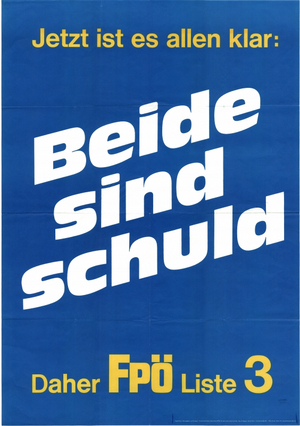
National Council election 1966
At the National Council election of 6 March 1966, Friedrich Peter campaigned as the lead candidate for the FPÖ. The Freedom Party obtained 5.35 per cent of the vote (-1.69 percentage points) and six National Council seats (-2).
In 1966, the ÖVP was able to achieve an absolute majority, while the SPÖ lost votes and seats, which left it clearly in second place.
Brief description of the election campaign
The National Council election of 1966 was strongly shaped by internal disputes within the SPÖ. After he had been expelled from the SPÖ because of a trade union donation to the FPÖ, Franz Olah competed against his former party with his own electoral list. The ÖVP issued warnings against the “rote Volksfront” (“red Popular Front”) and presented itself as a pragmatic party, an approach which allowed it to score points with the voters.
Meanwhile, the FPÖ again bet on the card of being the sole party of control and scrutiny. A central slogan on FPÖ posters was “Notwendiger denn je”, while others included “Wähl jene Kraft, die Ordnung schafft” and – alluding to the responsibility of both ÖVP and SPÖ for the country’s system of patronage and cronyism – “Beide sind schuld”. In addition, there was a poster with the slogan “Die Balgerei der beiden Kater ist nur das alte Wahltheater”.
Election result
The following parties and electoral lists stood for election at the National Council election of 1966:
Österreichische Volkspartei (ÖVP)
Sozialistische Partei Österreichs (SPÖ)
Freiheitliche Partei Österreichs (FPÖ)
Demokratische Fortschrittliche Partei (DFP-Liste Franz Olah)
Kommunisten und Linkssozialisten (KLS)
Liberale Partei Österreichs (LPÖ)
Marxisten-Leninisten Österreichs (MLÖ)
Parties | Votes | Vote share 1966 | ± | Seats 1966 | ± |
ÖVP | 2,191,109 | 48.35% | +2.95% | 85 | +4 |
SPÖ | 1,928,985 | 42.56% | −1.44% | 74 | −2 |
FPÖ | 242,570 | 5.35% | −1.65% | 6 | −2 |
Government formation
Since the ÖVP had for the first time since 1945 achieved an absolute majority, the ÖVP’s Federal Chancellor, Josef Klaus, was able to form a single-party government. In the SPÖ, Bruno Pittermann had to give way as Federal Party Chairman to Bruno Kreisky.
